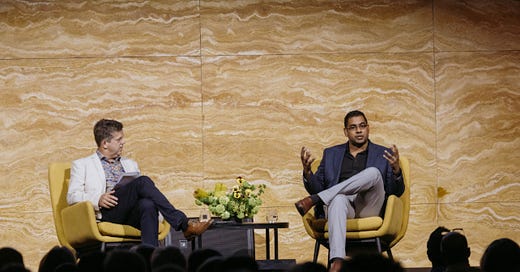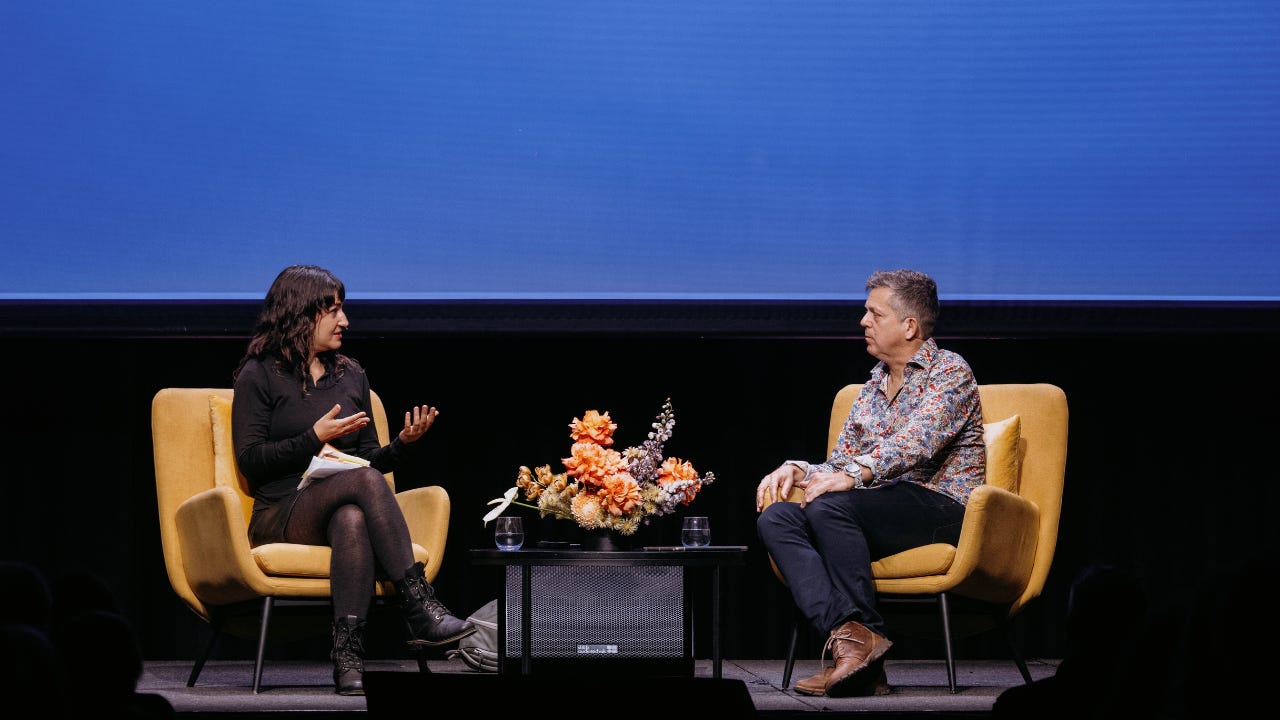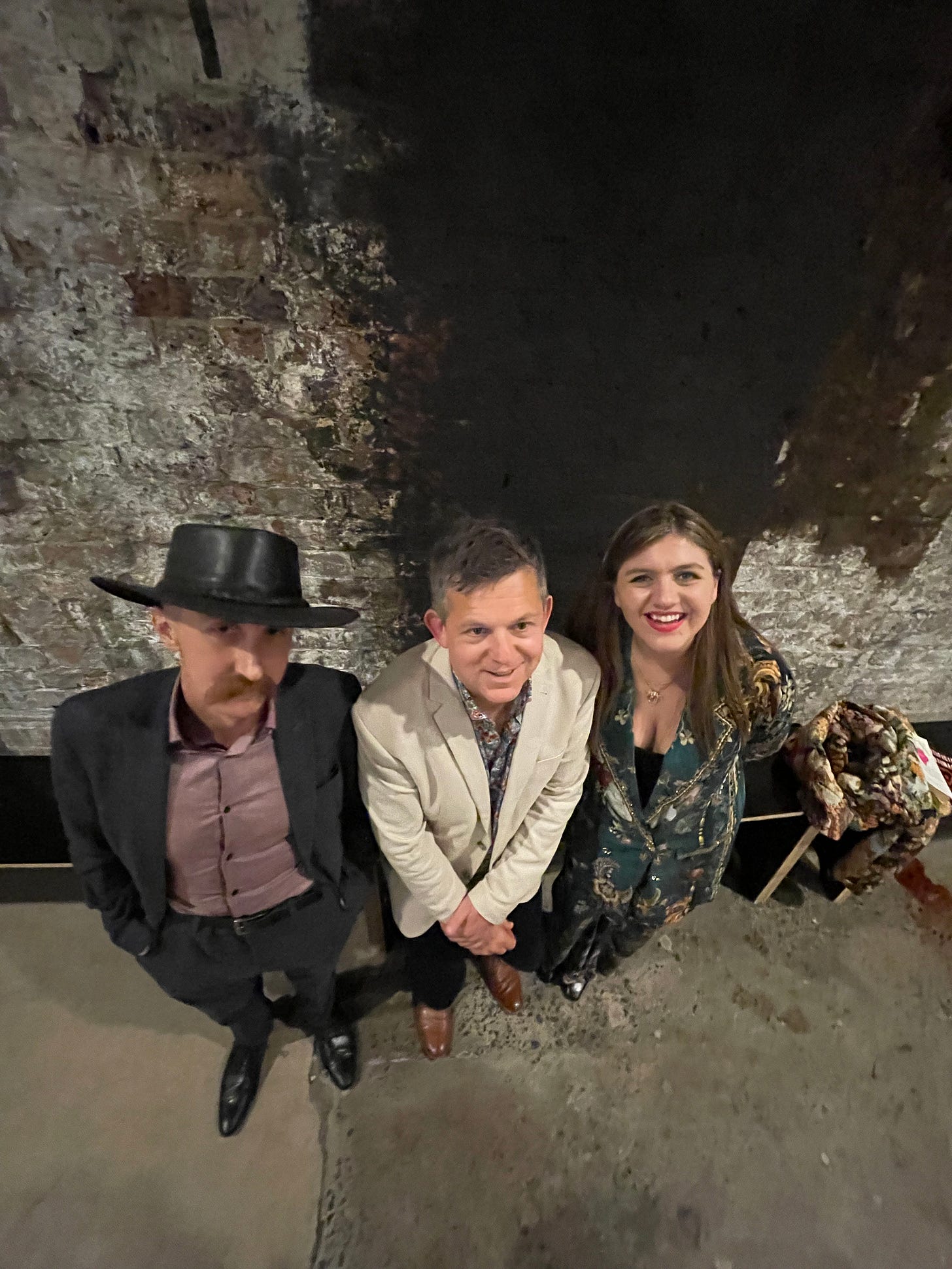Highlights of 2024 .. and some hints about 2025
Looking back on my year, I think I'm building toward some really positive things
Many people like to do a review toward the end of their year, set goals for the next, and start running when the New Year starter’s pistol fires. In stubborn contrast, I often get my best work done as the year winds down, probably as a way of avoiding small-talk at various work Christmas parties. That’s odd, because I’m a morning person, and I seldom leave projects to the last minute.
So, fresh off a fantastic summer holiday in wintery Japan, I spent yesterday reviewing 2024 and thinking about my priorities for this year. As always, it was rewarding to see all the wins and highlights in one place. So I decided that, before I get going on the work of 2025, it would be worth sharing some research and writing/speaking highlights. Here they are, in no particular order:
Michael Muthukrishna: A Theory of Everyone
At UNSW Sydney, we have the most fabulous public events team, the Centre for Ideas, who put on polished, audience-focused events. Several of my highlights each year involve working with the Centre, including the 2023 and 2024 Wallace Wurth Lectures. In 2024, to celebrate UNSW’s 75th anniversary, I had the delightful privilege of chatting with Michael Muthkrishna about his towering book A Theory of Everyone: The New Science of Who We Are, How We Got Here and Where We’re Going.
To call Michael a superstar of the evolutionary and cultural sciences is to sell him short. His work also draws on and makes contributions to economics, engineering, technology, sociology and a range of other fields. The book makes intelligible the complex forces that shaped human history without resorting to the “one idea that explains everything” formula we have come to expect from blockbuster non-fiction.
An even bigger feature that sets Michael’s work apart from the likes of Jared Diamond and Yuval Noah Harari, is his pragmatic and actionable advice about how to steer humanity toward the kind of future that most people want, and away from the many hazards that could befall us. He was an absolute pleasure to chat with on stage, giving the audience plenty to think about, being a very good sport when I probed some of the more controversial or unpalatable considerations, and not shirking the unpopular dimensions of his thesis.
It’s a cracking book, and Michael is such an important thinker that it was an absolute thrill to spend several hours in his company, both on and off-stage. You can listen to the audio recording of our conversation here.
Athena Aktipis: A Field Guide to the Apocalypse
Talking superstar public intellectuals, I also got to meet and participate in an event with another whose work I have long admired. Athena Aptikis builds mathematical models of cooperation. She also studies cooperation in the wild, from the cooperation within and among cells, so important for making bigger organisms that avoid cancer long enough to mature and reproduce to the kinds of cooperation that people depend on to stay alive in the staggering variety of places where people live.
Athena’s new book (A Field Guide to the Apocalypse: A Mostly Serious Guide to Surviving our Wild Times) brings cooperation theory to life with a great sense of fun, with witty prose, hilarious illustrations, and oodles of practical advice. She has been launching the book with a roadshow in the US, including several stops along Route 66, drawing in a host of comedians, musicians and other entertainers from her remarkable network of friends and connections. Athena herself is - at my conservative count - a quintuple threat, and when The UNSW Centre for Ideas persuaded her to bring her show to Sydney we were treated to her intellectual, singing, ukelele and comedic talents, as well as those of guitarist Ryan Biter.
Check out the audio of the show, including an interlude where I got to chat with Athena on stage about zombies, cooperation, prepping, and evolution.
How AI Might Influence Human Evolution
Back in 2022 as Chat-GPT was seeping into public awareness and Large Language Models became “so hot right now”, I was scrabbling for a new topic to talk about at a conference. I finally put together some ideas I had been accumulating about the long-term (like multi-generational) effects that AI might have on human evolution. In December this year, my first paper on the topic was published in Quarterly Review of Biology.
I count this as a massive win because, as you may have noticed, people have strong opinions about AI. That extends to evolutionary biologists, and in peer review the work was buffeted between disbelief that the topic was important and such enthusiasm for the topic that the 16,000+ words threatened to blow out to something beyond manageable. The referees’ comments at QRB proved tremendously useful, and, paired with the guidance of a judicious editor experienced in bringing bold ideas to life, the paper finally saw the light of day late in 2024.
The most important thing I would like people to take away is that AI is not a single technology that will affect our lives in a single way. It is already an ecosystem of technologies, and we interact with them in ways that are much like our interactions with the predators, parasites, pests, competitors, mutualists, and friends in the microbial, plant, fungal, animal and human worlds we inhabit.
Check out my brief introduction to the paper, and some of its builder claims, in The Conversation.
Writing this paper gave me so many new ideas, research directions, and some of the foundation for my next book proposal. I hope to have more to report when I review 2025.
History of Sex
No recording of this one. That might well prove a relief to all involved.
I’ve done enough panels at writing and ideas festivals to know what sometimes the magic lies thin on the ground. And sometimes, for reasons that cannot be bottled and sold, the magic abounds. On this particular wet and wintery Friday night at the Sydney Writers Festival, it was all around.
Social media superstar Esmé Louse James had just published Kinky History: The Story of Our Intimate Lives, Past and Present, a book that bore only three points of resemblance to David Baker’s Sex: Two Billion Years of Procreation and Recreation. Both were about the history of sex, both were very thick and intimidating tomes, and I had to read both in order to prepare for this event.
Despite their books, and David and Esmé themselves being about as different in persona as one might possibly imagine two authors could be, and despite it becoming apparent in the green room that at least two out of the three of us were braving out a hangover, this was an effervescent event. When writing about sex, it is always a challenge to bring together the fun, the absurdity, and the darkness inherent to human (and animal) sexual behaviour. But somehow, Esmeé and David, with a bit of prompting and prodding from the chair, really nailed the assignment.
Check out this review, which gives a third-party perspective.
2024 was a year in which I grew in confidence as a chair and interlocutor. It’s a skill I hope to refine and take to new audiences in the coming years.
UNSOMNIA 2024
This was the ninth year of UNSOMNIA, a program that I and my colleagues in the UNSW Grand Challenges Program, started. It is intended to discover and train public intellectuals, confident speaking to the public about the kinds of things academics mostly discuss with colleagues, policymakers and industry partners.
Now produced by … you guessed it …. the amazing Centre for Ideas, the program has become a highlight of UNSW’s calendar and entry is quite competitive. Somewhere along the way, I became one of the trainers who help speakers bring their idea from a 60-second pitch to a polished public performance.
This year’s crop of performers had a particular enthusiasm that stood out, even among the many years of great alumni that came before. Picking favourites or even exemplars would be wrong, and get me into trouble. But you can check them out and see their talks here.
Other Highlights
Graduated two honours students, one in Medicine and one in Psychology, both on the social dimensions of chatbots. This was a good strategy as I’m not getting many biology students any more. One of those students is going on to do a PhD with me, which I am also thrilled about.
Attended the first-ever “Machine Behaviour” conference at Harnack Haus in Berlin. Spring in Berlin is so pleasant, and this multi-discipline conference so exciting, that I have been hatching plans for scientific visits and perhaps an extended sabbatical ever since. I also entered and won a place in the 2025 Berlin Marathon lottery. So I’m going to see quite a bit of Berlin.
Returned to the ISBE (Behavioral Ecology) conference for the first time in 14 years. This used to be my “home” conference, and it remains a favourite. I spoke about the possibility of behavioural ecology extending to machine behaviour. The message needs a bit of refinement, but people had interesting responses.
I loved researching and writing this article about chatbots and friendship for Quillette. Chatbots are only going to become a bigger part of our lives, and we need to take them seriously as social actors, if only for our own psychological well-being.
The first papers from a large collaborative project on status are in review.
Let me know some of your highlights in the comments, and have a fabulous 2025.







